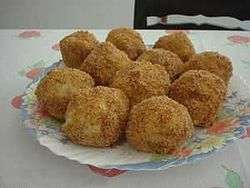Knedle
Knedle (from German knödel, "dumpling"), is a dish of boiled potato-dough dumplings filled with plums, popular in Central and East European countries, especially in Poland, Hungary, Romania, Slovakia and Czech Republic. The dish is eaten as dessert, a main dish, or side dish.
 knedle, plum-filled dumplings | |
| Alternative names | Knödel, gomboce |
|---|---|
| Type | Dumpling |
| Main ingredients | Potato dough, plum |
Name
It is known as plum dumplings in English, and in other languages as: Austrian German: Zwetschkenknödel, German: Zwetschgenknödel, Hungarian: szilvásgombóc,[1] Serbo-Croatian: Knedle od šljiva, Knedle or alternatively Gomboce in Vojvodina, Slovene: slivovi cmoki, Slovak: slivkové knedle,[1] Czech: švestkové knedlíky,[1] Polish: Knedle ze śliwkami,[2] Romanian: Găluște/Gomboți cu prune.[3]
Preparation
The dough is made with mashed potatoes. Some recipes use eggs in the dough, some flour. The dough is flattened out and cut into squares. The plums are inserted inside the dumplings by hand.[4] Some versions of the dish use noodles instead of potatoes. The preparation can include removing the stone and stuffing the fruit with sugar. The plums are then completely wrapped in dough and dropped in boiling water. When they start floating, they are taken out, sprinkled with sugar, and served. They can also be covered with breadcrumbs fried in butter. Cinnamon or sour cream are sometimes added before serving. It seems that the dish originated in the Austro-Hungarian Empire.[3][5]
See also
References
- The Oxford Companion to Sugar and Sweets. Oxford University Press. 1 April 2015. pp. 37–. ISBN 978-0-19-931361-7.
- Robert Strybel; Maria Strybel (2005). Polish Heritage Cookery. Hippocrene Books. pp. 478–. ISBN 978-0-7818-1124-8.
- Gelu Radu; Corina Radu. Cookbook from Transylvania and other places of the world (Carte de bucate ardelenesti si nu numa'): 150 illustrated step‑by‑step recipes, written in Transylvanian dialect and English. Fan Zone SRL. pp. 154–155. GGKEY:6P9PP2SUQ3H.
- "Hungarian Plum Dumplings Recipe - Szilvas Gomboc". About.com. Retrieved 19 December 2013.
- Adamsbaum, Mark; Lengyel, Reka (2012). Dirty Hungarian: Everyday Slang from What's Up? to F*%# Off!. Ulysses Press. p. 151. ISBN 1612430538.
Sources
- Gundel, Karoly (1992). Gundel's Hungarian cookbook. Budapest: Corvina. ISBN 963-13-3600-X. OCLC 32227400.
- Dumplings with Plums - Plum Balls - Knedle, retrieved on September 19, 2007.
- Recipe (in Polish) in the "Gazeta" newspaper, retrieved on September 19, 2007.
- Recipe (in Polish) by "wiadomosci24" news service, retrieved on September 19, 2007.
External links
